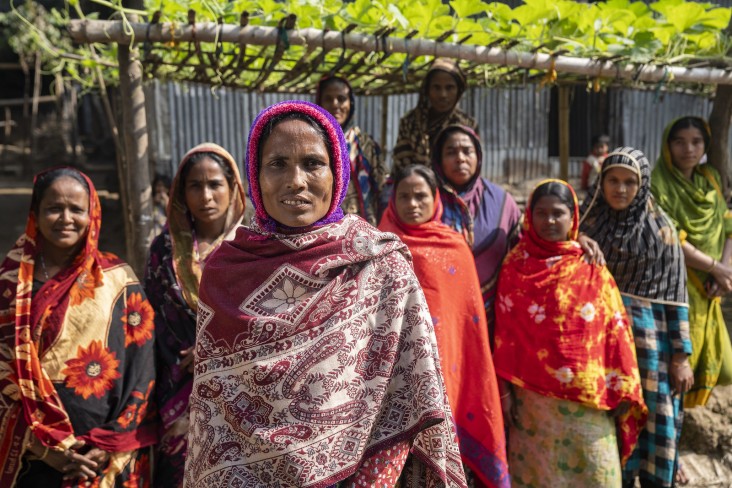Speeches Shim

Bangladesh has made remarkable progress in the last 20 years in improving the lives of women and girls. Maternal mortality rates are falling, fertility rate is declining, and there is greater gender parity in school enrolment. At the same time, 82 percent of married women suffer gender-based violence and pervasive sexual violence prevents women from achieving their full potential. Despite efforts by the government and non-governmental organizations to reduce the rate of child marriage in Bangladesh, it remains the highest in South Asia at 59 percent of girls getting married before the age of 18. Women’s participation in the workforce remains constrained to limited, low-paying sectors. Three million Bangladeshi women are employed in the lucrative ready-made garment sector, which is Bangladesh’s largest export industry. Increasing numbers of women are involved in small and medium enterprises, but there remain large finance gaps that women face despite several government initiatives. Across its programs, USAID is committed to addressing many of the challenges facing women in Bangladesh.
Promoting Women's Entrepreneurship
USAID promotes economic growth while increasing women's empowerment. In Bangladesh, few women entrepreneurs and retailers sell farming tools and products. USAID supported a women entrepreneurs’ boot camp for 80 female agro-entrepreneurs. USAID’s agriculture mechanization activities have also trained women as local service providers for such agricultural equipment as reapers and power tillers. As a result, 139 women—among the first—are now involved in farming mechanization service businesses. USAID efforts helped women secure loans for this game-changing agricultural machinery from a range of sources, including government sources, private commercial banks and microfinance institutions.
Despite the success of microfinance in helping improve poor women’s access to finance, many women in rural Bangladesh are still required to take out high-interest loans through informal money lenders to earn a living and care for their families. USAID helped establish the community savings groups that enable women in the fishing villages to invest their savings, take out regular loans approved by the group, and start small enterprises to support their families. As a result, more women in Bangladesh now have access to low-interest loans that help them be more resilient and independent.
Promoting Food Security and Healthy Communities
Bangladesh is one of the countries most vulnerable to malnutrition. For example, 36 percent of children under the age of five are stunted and 33 percent are underweight. In addition, 31 percent of women and girls aged 15 to19 are undernourished. USAID is helping increase women participation in the private sector and improve their access to market systems. USAID’s Bangladesh Aquaculture and Nutrition and Livestock for Improved Nutrition activities are helping improve women’s practices around nutrition, and provide valuable sources of sustainable income for households, such as drying fish and raising livestock. Focusing on women has led to a significant impact on malnutrition in Bangladesh, reducing stunting by over 20 percent in project areas. USAID has also developed a mobile application that promotes social behavior change for nutritional messaging and zinc-fortified rice promotion, particularly among women. USAID’s Agricultural Value Chain activity, which promotes access to finance, environmental compliance, nutrition, and gender equity, partnered with local organizations of empowered women entrepreneurs and business owners to help break down barriers and biases for women.
Advocating for Women’s Leadership in Society
In Bangladesh, few women occupy real leadership roles. USAID supports women’s political and civic participation, cultivating women’s leadership roles in areas such elections and political processes. Through USAID’s Strengthening Political Landscape’s activity, 309 women leaders won seats in mainstream party leadership committees. Separately, USAID’s Workers’ Empowerment Program provided opportunities to women to be leaders in the workplace and extended their worker rights beyond the factories and into their own communities. As a result, women workers are learning ways to engage and create a stronger social network, advocating for their rights in local communities and connecting them to resources through community groups.
Empowering Women against Gender-Based Violence
Gender-based violence affects every sector. USAID supports Bangladeshis at risk of child marriage, gender-based violence, human trafficking, and violent extremism across 20 districts. USAID has provided shelter services, psycho-social counseling, legal services, job skills training, and job-placement support for survivors. USAID’s Obirodh activity organizes events that provide young Bangladeshis an opportunity to discuss issues related to radicalization, recruitment, tolerance, and diversity, with special emphasis on how young girls can play more active roles in their communities to prevent and counter violent extremism.


Comment
Make a general inquiry or suggest an improvement.